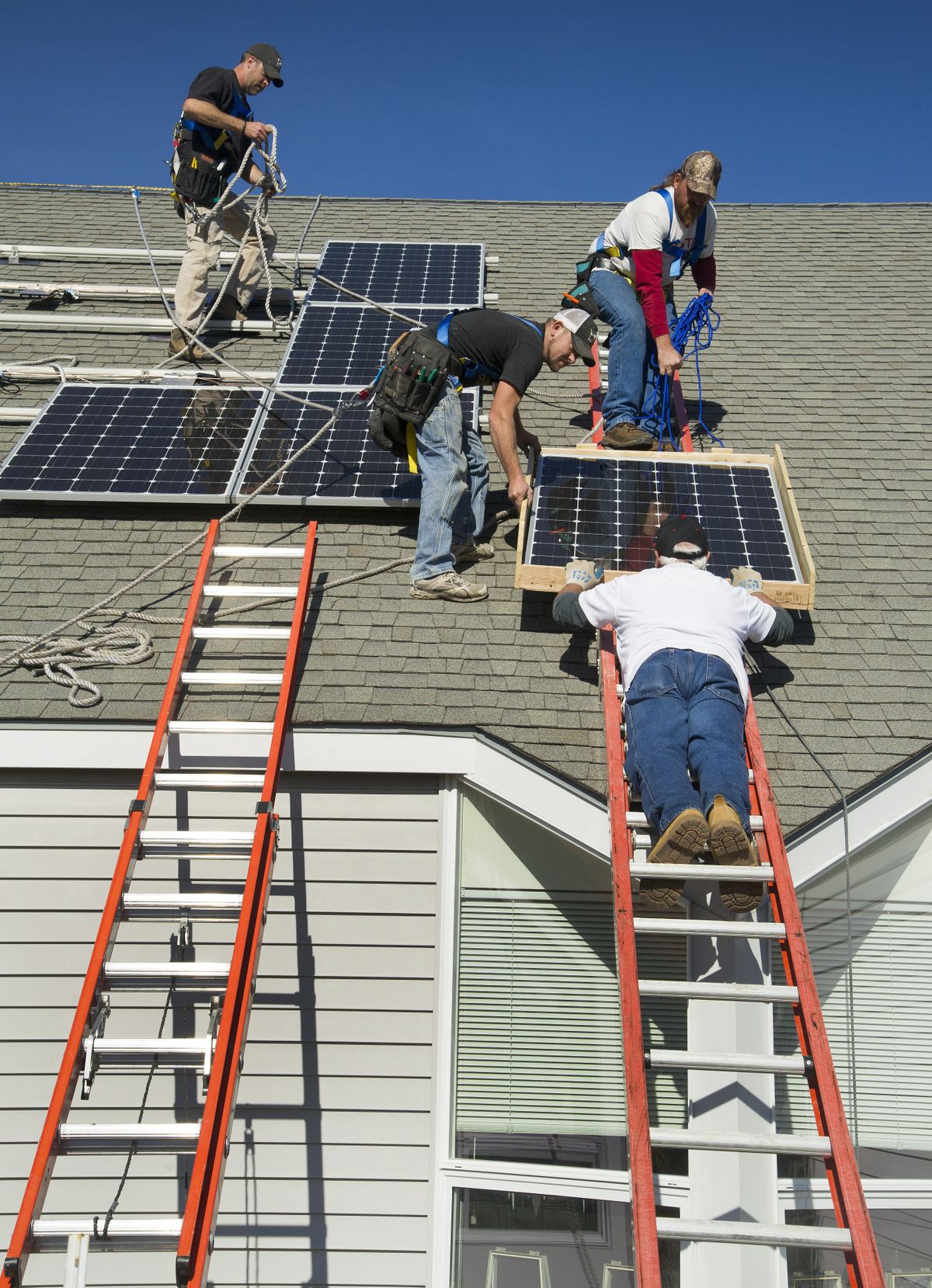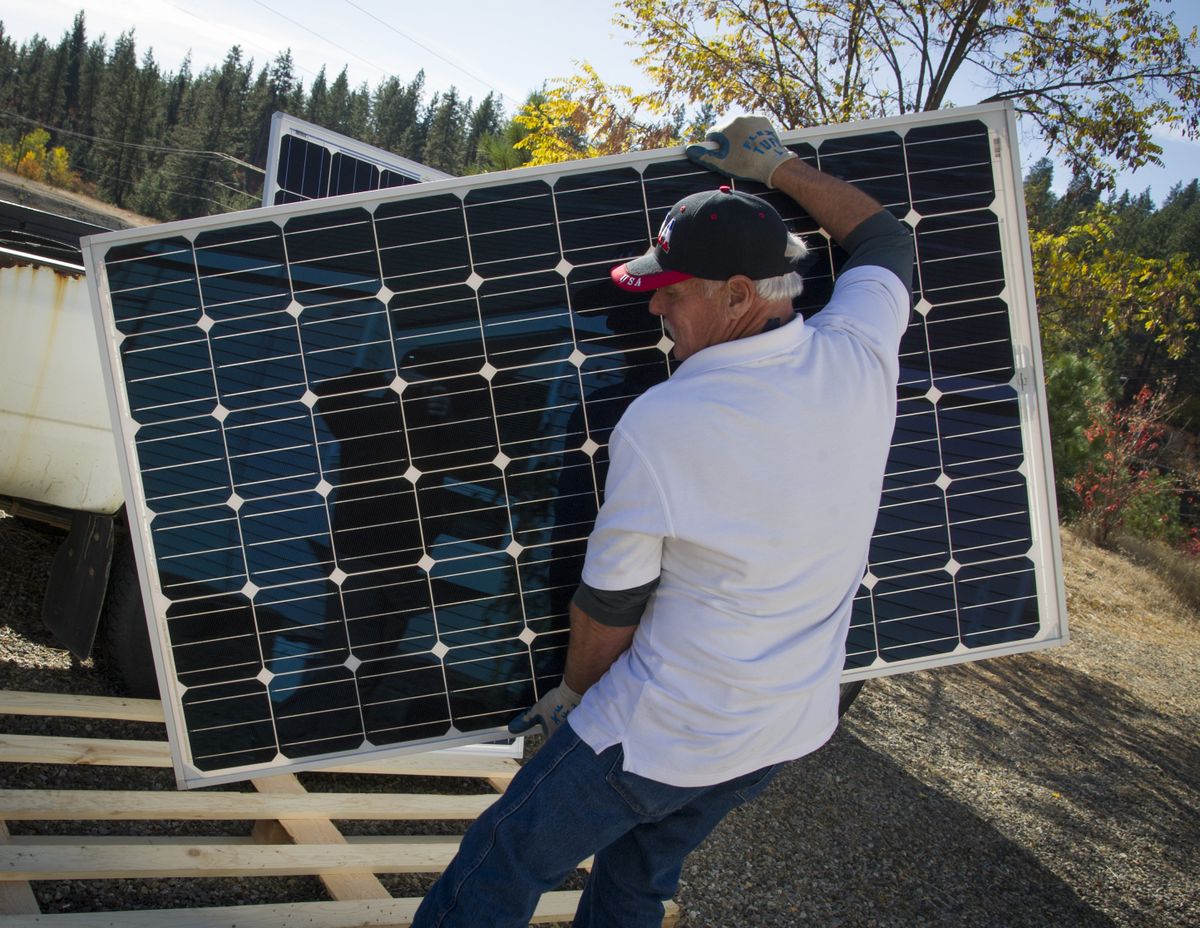Church, property owner make solar energy cost-effective
Mike Coulter, project manager with PCI Renewables, slides a solar panel up to workers, from left, Mark Leo, Billy Truax and Todd Owens at the Unitarian Universalist Church of Spokane on Wednesday. (Colin Mulvany)Buy a print of this photo
Two Spokane property owners investing thousands of dollars in solar energy panels say financial incentives from federal and state governments made the decision easy.
The Community Building LLC, which operates the Community Building in downtown Spokane, and the Unitarian Universalist Church of Spokane are in the midst of installing large solar projects. The Community Building is replacing 32 solar panels installed in 2000, the first commercial solar panel installation in Spokane County, with more efficient panels.
“We expect the system to pay for itself in 6 1/2 years, and it will have a 30-year life span,” said Austen White, the operation’s maintenance techician.
He and James Sheehan, owner of the building at 35 W. Main Ave., haven’t released the cost of the upgrade.
But “doing this was a no-brainer,” White said.
“The purchase price of equipment can be expensive, but our example shows that with federal and state incentives, it’s not as hard as you’d think,” he said.
The Community Building and neighboring Saranac Building have about 40 tenants, mostly nonprofits.
The Unitarian Universalist Church, at 4340 W. Fort Wright Drive, is installing 75 solar panels in a project its partner, SustainableWorks, is calling one of the largest in the state.
The church is spending more than $80,000 to install the panels. It expects to finish the job in two weeks.
SustainableWorks, a statewide nonprofit that helps groups with energy efficiency projects, is giving the church a 10-year, interest-free $50,000 loan.
The church is easily the largest solar project the group has taken on, said Aaron A.J. Johnson, project manager for SustainableWorks.
With upgrades to the church’s heating and ventilation systems, the church is expected to save $4,000 per year or more in energy costs, said Tom Mosher, a church member and one of the members of a committee directing the solar project.
He said a conservative estimate is the system will pay for itself in 12 to 14 years, if not sooner.
Both the church and the Community Building projects are taking advantage of federal incentives that will offset some of the project costs.
The Community Building project is also using incentives put into effect by Washington state in 2006. The federal incentive brings a tax credit worth 30 percent of the cost of the new equipment, said White, the maintenance technician.
Since all its solar panels and inverters – the couplers that convert direct current to alternating current – were made in Washington, the Community Building also will pay no sales tax on the cost of the equipment under a separate state program, he said.
What’s more, the project will get a state rebate of 54 cents per kilowatt-hour of energy produced – that will come to the maximum rebate allowed, $5,000 per year, White said.
Since the church doesn’t pay income tax, it doesn’t need that federal tax credit, congregation minister Todd Eklof said.
It will get the Washington rebate, but at a lower amount of 15 cents per kilowatt-hour of energy produced because the solar equipment the church is using was made in Oregon, not Washington, Johnson said.
“I calculate that based on the 15-cent rebate, they’ll get an annual rebate of about $3,700,” said Bruce Gage, co-owner of Spokane-based Eco Depot, who is heading up the installation on the Community Building.
Mosher said the church considered but decided against buying Washington-made equipment, mostly because the Oregon source it used, Solar World, in Hillsboro, has been in business for more than 20 years. The Washington companies, based in Bellingham and Marysville, have been around for fewer than five years, he said.
Gage noted that the Washington sales tax exemption for new solar equipment expires next year. He believes that’s a factor in increased interest in solar installations among homeowners and businesses.
The federal tax credit continues through 2016, he said.
Avista Utilities, the largest electric utility in Eastern Washington, reported it has signed 121 solar contracts in Washington state and another 29 in Idaho.
Company spokesman Dan Kolbet said 98 of the Eastern Washington solar contracts are for homes; the rest are for business customers.
The number of solar installations keeps growing but hasn’t spiked in recent years, Kolbet said.

